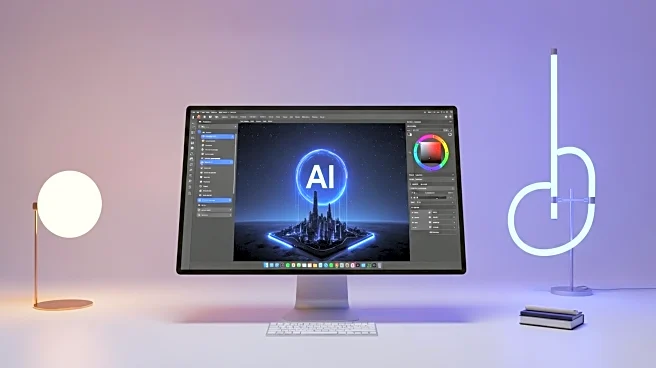What is the story about?
What's Happening?
Hun Kim, the creative director at Karl Lagerfeld, has integrated artificial intelligence (AI) into the fashion design process, transforming traditional workflows. During the Alvanon 3D Tech Fest, Kim explained how AI has revolutionized the way designs are created and presented. Previously, the design process involved sketching ideas, selecting fabrics, and waiting weeks for prototypes. With AI, Kim can now generate realistic images from hand sketches within minutes, allowing for quicker design decisions and improved product planning. AI tools like Vizcom AI and Runway AI are used to create photorealistic renderings and cinematic presentation videos, respectively. This integration has not only enhanced efficiency but also expanded creative possibilities, enabling Karl Lagerfeld to connect with younger audiences through virtual models and AI influencers.
Why It's Important?
The adoption of AI in fashion design signifies a major shift in the industry, emphasizing speed, clarity, and visual storytelling. By reducing the time between concept and prototype, designers can make more informed decisions, enhancing the overall quality and appeal of their collections. This technological advancement is crucial for staying competitive in a fast-paced market where consumer preferences rapidly evolve. Companies that embrace AI can streamline operations, reduce costs, and improve customer engagement through innovative digital experiences. As AI becomes a necessity rather than an experiment, it offers a strategic advantage to those willing to adapt, potentially reshaping the future of fashion design and retail.
What's Next?
As AI continues to gain momentum, fashion companies are likely to further explore its capabilities, such as virtual draping and sewing, to produce realistic digital garments. The potential for AI-generated designs to become wearable almost instantly could revolutionize the industry, leading to new forms of wearable technology. Companies like Nvidia are investing heavily in AI, indicating a future where AI-driven processes become standard practice. Fashion brands may increasingly rely on AI to enhance creativity, efficiency, and market reach, potentially leading to collaborations with tech firms to develop cutting-edge solutions.
Beyond the Headlines
The integration of AI in fashion design raises ethical and cultural questions about the role of technology in creativity. While AI offers efficiency and innovation, it also challenges traditional notions of craftsmanship and artistic expression. Designers must navigate the balance between human creativity and machine-generated outputs, ensuring that technology enhances rather than diminishes the artistic process. Additionally, the use of AI in fashion could influence cultural trends, as digital experiences become more prevalent in consumer interactions.















